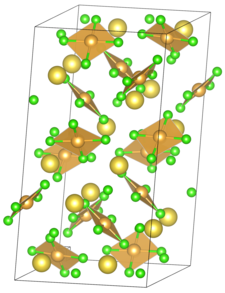Sodium tetrachloroaurate
 | |
| Names | |
|---|---|
| IUPAC name
Sodium tetrachloroaurate (III)
| |
| Other names
Sodium gold chloride, yellow gold chloride
| |
| Identifiers | |
3D model (JSmol)
|
|
| ChemSpider | |
| ECHA InfoCard | 100.035.659 |
| EC Number |
|
PubChem CID
|
|
| UNII | |
CompTox Dashboard (EPA)
|
|
| |
| |
| Properties | |
| NaAuCl4 | |
| Molar mass | 361.756 g/mol |
| Appearance | Orange powder |
| Density | 3.81 g cm−3[2] |
| anhydrous: 139g/100ml (10°C) 151g/100ml (20°C) 900g/100ml (60°C)[3] | |
| Solubility | Sparingly soluble in diethyl ether,[4] soluble in alcohol, ether[3] |
| Hazards[5] | |
| GHS labelling: | |
 
| |
| Danger | |
| H315, H319, H335 | |
| P261, P264, P271, P280, P302+P352, P304+P340, P305+P351+P338, P312, P330, P332+P313, P333+P313, P337+P313, P363, P403+P233, P405, P501 | |
Except where otherwise noted, data are given for materials in their standard state (at 25 °C [77 °F], 100 kPa).
| |
Sodium tetrachloroaurate is an inorganic compound with the chemical formula NaAuCl4. It is composed of the ions Na+ and AuCl4−. It exists in the anhydrous and dihydrate states. At room temperature, it exists as a golden-orange solid. The anhydrous and dihydrate forms are available commercially.[1]
Preparation
The conventional method of preparation of sodium tetrachloroaurate involves the addition of tetrachloroauric acid solution to sodium chloride or sodium carbonate to form a mixture. The mixture is stirred at 100 °C, and then subjected to evaporation, cooling, crystallization, and drying to obtain the orange crystals of sodium tetrachloroaurate.[4][6]
- H[AuCl4] + NaCl → Na[AuCl4] + HCl
- 2 H[AuCl4] + Na2CO3 → 2 Na[AuCl4] + H2O + CO2
However, more efficient preparation methods have been discovered recently. These are the addition of gold with sodium oxy-halogen salts and hydrochloric acid.[6]
Uses
It is used in a wide range of applications. For example, it is used as a catalyst for the hydrochlorination of acetylene, or the oxidation of sulfides.[4]
References
- ^ a b PubChem. "Sodium tetrachloroaurate". pubchem.ncbi.nlm.nih.gov. Retrieved 2019-05-19.
- ^ Jones, P. G.; Hohbein, R.; Schwarzmann, E. (1988-07-15). "Anhydrous sodium tetrachloroaurate(III)". Acta Crystallographica Section C Crystal Structure Communications. 44 (7). International Union of Crystallography (IUCr): 1164–1166. Bibcode:1988AcCrC..44.1164J. doi:10.1107/s0108270188002756. ISSN 0108-2701.
- ^ a b Perry, Dale L. (2011). Handbook of Inorganic Compounds. CRC Press; 2 edition (May 18, 2011). p. 380. ISBN 9781439814611.
- ^ a b c Westcott, Stephen A. (2001), "Sodium Tetrachloroaurate(III)", Encyclopedia of Reagents for Organic Synthesis, American Cancer Society, doi:10.1002/047084289x.rs108, ISBN 9780470842898
- ^ "Sodium Tetrachloroaurate". www.espimetals.com. Retrieved 2019-05-20.
- ^ a b US 10046976, Lu, Lin; Wang, Chen-Hsiang & Fan, Kuei-Sheng et al., "Method of making inorganic gold compound", published 2018-08-14, assigned to Tripod Technology Corp.
- Articles without EBI source
- Articles without KEGG source
- ECHA InfoCard ID from Wikidata
- Chembox having GHS data
- Articles containing unverified chemical infoboxes
- Chembox image size set
- Articles with short description
- Short description matches Wikidata
- Gold(III) compounds
- Inorganic compounds
- Chlorometallates
- Aurates